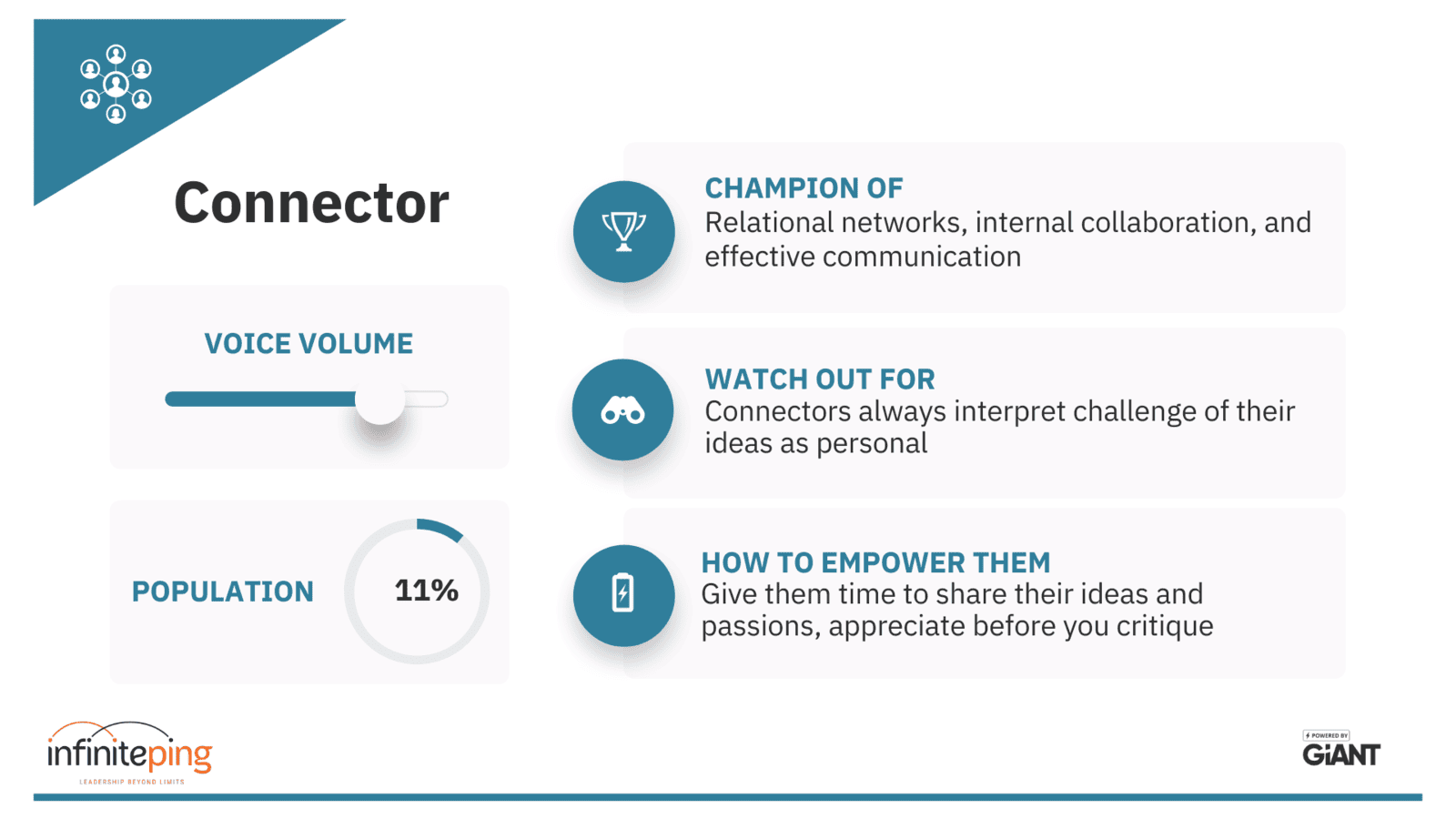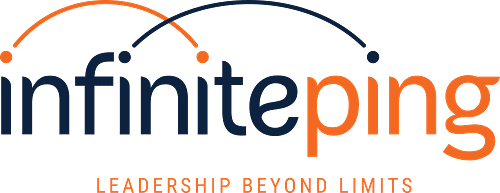Connecting People, Creating Impact
Connecting People, Creating Impact
In every team, it's likely you have a person that says, "Hey, I know someone who can help us with this, and it will be a gamechanger!" This is a tell-tale sign you have a Connector in your midst. The Connector Voice stands out as the social glue that binds the group together. Connectors are the natural relationship builders and champions of the cause. They possess a unique ability to see opportunities, gather resources, and energize those around them.
In this fourth installment of our series on the GiANT 5 Voices framework, we'll explore the core characteristics of the Connector Voice, their contributions, potential challenges, and how to engage with them effectively.
Who are the Connectors?
Connectors are the vibrant and enthusiastic individuals who naturally excel at building and maintaining relationships. They are the social catalysts in any group, effortlessly connecting people and ideas. Their primary motivation is to bring together individuals who might benefit from each other’s experiences, knowledge, or perspectives. Connectors are often the first to initiate conversations and the last to leave networking events, driven by a genuine interest in others and a knack for seeing potential synergies.
Key Traits:
Socially adept and outgoing
Strong communicators with persuasive abilities
Naturally curious about people and their stories

Find Out If You Are a Connector
Defining the Connector Voice
The Connector Voice is characterized by its future-oriented outlook and enthusiasm for relationships. Connectors are visionary enthusiasts who can see the big picture and rally people around shared causes and opportunities. They excel at gathering resources and leveraging their extensive networks to drive initiatives forward. Their primary focus is on fostering relationships and ensuring that everyone feels included and valued.
In contrast, consider the Guardian Voice, which is more focused on the present along with the details, processes, and maintaining stability. While Guardians prioritize efficiency and due diligence, ensuring that systems and structures are solid, Connectors are more spontaneous and flexible, often prioritizing people and relationships over rigid processes. This juxtaposition highlights a fundamental difference in how these voices approach challenges and opportunities: Connectors thrive in dynamic environments where they can leverage their social networks, whereas Guardians excel in structured settings where they can ensure consistency and reliability.
Core Characteristics of Connectors:
- Future-oriented and visionary
- Skilled at building and maintaining relationships
- Persuasive communicators who inspire action
Strengths of the Connector Voice
Connectors bring a multitude of strengths to any team. They excel at fostering an inclusive and positive environment, ensuring everyone feels involved and valued. Their ability to connect diverse people and ideas often leads to innovative solutions and enhanced collaboration. Moreover, Connectors are excellent ambassadors for the team’s mission and values, promoting these with passion and clarity.
Key Strengths:
- Building and maintaining a wide network of relationships
- Driving collaboration and innovation
- Promoting the team’s mission and values effectively
Example: Emily, a Connector, is known for her ability to organize cross-departmental meetings, facilitating creative problem-solving and unity.
Challenges for the Connector Voice
Despite their many strengths, Connectors face unique challenges. Their enthusiasm and desire to help can lead them to overcommit, spreading themselves too thin and risking burnout. They may also struggle with conflict avoidance, as they often prioritize harmony over difficult conversations. Additionally, Connectors’ desire for approval can sometimes result in an overemphasis on popularity, potentially compromising authenticity.
Common Challenges:
- Over committing and struggling with time management
- Avoiding conflicts to maintain harmony
- Seeking approval, sometimes at the expense of authenticity
How Connectors Can Thrive
To thrive, Connectors need to balance their natural inclinations with practical strategies. Setting clear boundaries and prioritizing tasks can help them manage their time and commitments effectively. Developing conflict resolution skills is also crucial, as it enables them to address issues constructively. Connectors should seek feedback regularly to maintain authenticity while navigating their desire for approval.
Strategies for Success:
- Prioritize tasks and set boundaries to avoid over commitment
- Develop conflict resolution skills to address issues directly
- Seek regular feedback to balance authenticity and approval
The Connector Voice in Leadership
As leaders, Connectors excel at creating a strong team culture and fostering collaboration. They are adept at building networks and leveraging relationships to achieve organizational goals. However, to be effective leaders, Connectors must balance their relational focus with strategic thinking, ensuring they don’t neglect the broader organizational objectives. They should also work on developing a more direct communication style to address issues and provide constructive feedback.
Leadership Qualities:
- Building a positive and inclusive team culture
- Leveraging networks for strategic advantage
- Balancing relational focus with organizational objectives
Practical Applications for Growth and Development
Connectors can continue to grow by focusing on specific areas for development. Time management is crucial to avoid burnout, while conflict resolution skills can help them handle difficult situations more effectively. Embracing authenticity and seeking honest feedback can also enhance their leadership abilities.
Growth Opportunities:
- Improve time management and delegation skills
- Develop conflict resolution techniques
- Seek feedback to ensure authentic interactions
Putting it All Together & Taking Action
The Connector Voice is a vital component of any successful team, bringing energy, enthusiasm, and a talent for building relationships. By understanding and leveraging their unique strengths, Connectors can unlock their full potential and significantly impact their organizations.
How can you make the most of the Connector Voice in your organization?
- Encourage Their Passion: Give Connectors the platform to share their ideas and visions.
- Foster a Supportive Environment: Create a culture where open communication is valued.
- Provide Opportunities for Networking: Leverage their natural networking abilities.
- Recognize Their Contributions: Acknowledge their efforts in connecting people and driving collaboration.
Ready to elevate your team’s performance? Discover how the 5 Voices framework can transform your team dynamics and unlock hidden potential. Explore our workshops, assessments, and coaching programs designed to bring out the best in every voice, especially the invaluable Connector.
Take the first step today! Schedule a Call or Take the Free Assessment to start your journey towards a more cohesive and productive team.
